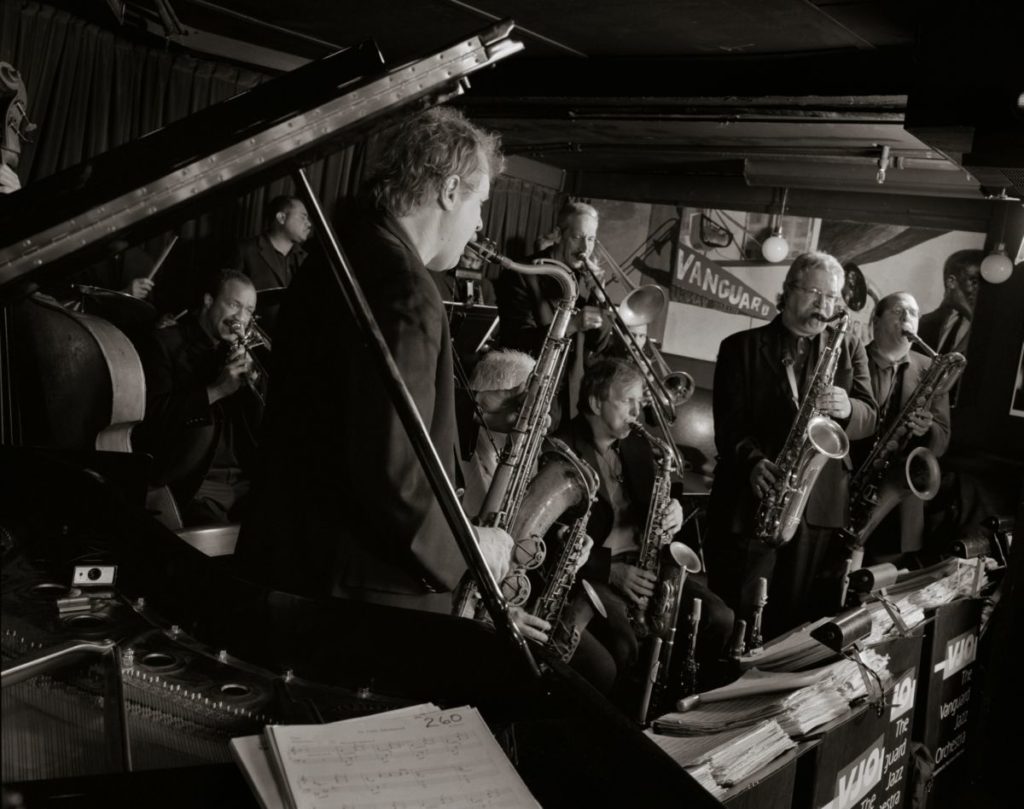
Should the term ‘Community Leader’ go into Room 101?
John McKnight has a passion for jazz. Once a year he becomes a roadie for one week and travels on a bus with an ageing ‘old time’ jazz band. He once told me if he hadn’t gone down the road he went, a life as a Jazz musician would have been a dream come true. Not at all surprisingly, one of his favourite metaphors for leaderless groups is a jazz jam session. He contrasts this open-ended, free-style with the more formal hierarchical styles of leadership you see in an orchestra, where the arrangement is preset, the functions and performance standards predefined, and the worthy outcome orchestrated from the front, compliments of the Maestro.
A jam is what happens in a dynamic community. Sure it is true that the circle is often convened for the purposes of gift exchanges of one kind or another, but everything else is emergent. And, who knows what might be created? The ambiance and the connections are what matter – it is largely a leaderless but connection full affair.
Yes someone often needs to do some convening (and that’s not always even necessary) but largely it’s a group thing; about ‘we’, not ‘me’.
But let’s get real for a moment- what good is a jam-like approach in the face of social and economic struggles and injustice?
Are Leaders the only answer to social injustice?
Well, the answer is far from clear-cut, because it really does depend on the context. One thing is certain, the assumption that change is reliant on finding the right leader, at the right time, is still commonplace. Of course social change does not launch itself from a standing start; nor does it hatch itself fully formed from the ‘I have a Dream’ podium complements of the heroic contributions of an iconic leader. Deep down, we all know the wellspring of enduring social change is much more modest and closer to the ordinariness of home than the myth of ‘the leader’ would have us believe. Its nest is associational life itself and not inspirational oratory. But that does not stop us acting as though the reverse were true.
Behind iconic leaders like Dr. Martin Luther King Jnr are millions of so-called ordinary folks in thousands of neighbourhoods, who are rendered invisible in the glare of greatness that their seemingly limitless charisma generates.
‘Leaders lead with great vision; people follow with great energy’. That’s what many of us have been brought up to believe. It’s the narrative that enchants us over and over again. Eight years ago it was Obama, this last year it was the wonderful Bernie Saunders in the US, and to a lesser extent Corbyn in the UK.
But what if Trump and Obama are opposite ends of the same coin, the leadership coin? What if this is fool’s gold? What if the issue is not Trump’s narcissism or Obama’s failure to be the Messiah, but our need for them to do our civic and political bidding for us, when it is patently clear that both – for very different reasons- are completely incompetent to do so? Why? Because, no one is capable of such feats and to expect otherwise is dangerous and delusional.
For these reasons among others (see below) we would like to propose that we put Leadership, but especially Community Leadership in Room 101, and actively replace it with Connectorship or Communityship. We appreciate this is not a very attractive proposition since there’s far more comfort for most of us citizens in delegating our political freedoms and functions to an ‘Uber-Citizen’ or even it seems to an ‘Uber-Maniac’ than to live with the messiness of decentralised leadership.
“Someone else will do it, after all isn’t that why we pay taxes?” is a common refrain when it comes to creating an alternative future in our communities and society in general.
But let’s turn our attention away from politicians and matters of state, and go back to home ground, back into the power dynamics of the local neighbourhood, village or estate. Here too we see certain folks being singled out as leaders and then elevated to the position of heroes. But in this context, who gives community leaders the status of hero? In many of the communities we’re working in, we see a disturbing trend emerging where increasingly, leaders do not grow up through community endorsement but are elevated by outside agencies to sit on their advisory panels, and latterly endorsed by neighbours on the basis of their ability to deal with these agencies. We’d argue that this form of singling out or reification, has little to do with what matters to communities, and everything to do with agencies hell bent on fixing what they perceive to be the matter with communities.
Daily we hear the labels given to residents such as ‘the usual suspects’, ‘community representatives’, ‘local leader/advisors’ etc. while others are considered as NOT having the apparent commitment or passion to sit at the agency table being referred to as ‘apathetic’, ‘non-engaged’ or ‘hard to reach’. To us this seems to be an all too convenient way for a system or institution to communicate with a community or social movement.
There are, in all communities, many wonderful webs of connections and stories of hardwork, grit and determination that keeps community building efforts alive, often without the knowledge of those identified as leaders. This worshipping of, or the artificial knighting of, leader-heroes reminds us of the words of the popular educator and community development theorist, Paulo Freire;
“The oppressors do not favor promoting the community as a whole, but rather selected leaders.”
Many in the field of community development live by the mantra: ‘Do no harm’. But what if in the name of being helpful, our ‘support’ of grassroots leadership displaces the efforts of many. What if our need for institutional efficiency means we unintentionally lean on the shoulders of the few because we simply can’t find the many?
When it comes to the wellbeing of a community, it is the health of the group that matters most and not the capacity of the leader. And so this week, in the last part of our three part series, we would like to ask you to join us in placing the term Community Leader in Room 101, and in the spirit of abundance to replace it with Connectorship.
Cormac Russell and Shaun Burnett (@shaunburnett85)

